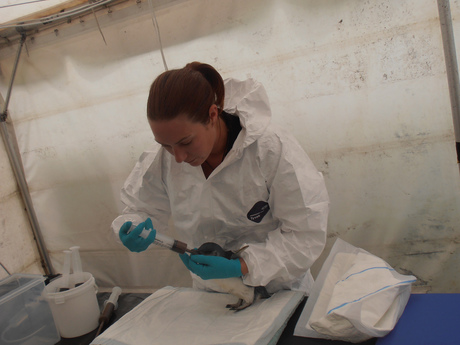Rescue program for wildlife caught in oil spills

Two universities researching oil spill wildlife emergencies have launched a global training program to improve preparation for, and response to, wildlife affected by oil spills.
The Oiled Wildlife Response Training (OWRT), jointly developed by New Zealand’s Massey University and the University of California (UC) Davis, was recently presented at the international oil spill conference Spillcon 2016, running from 2–6 May in Perth.
OWRT delivers both online and face-to-face teaching covering field search and collection, cleaning and rehabilitation, development of oiled wildlife facilities, preparedness and emergency crisis management.
The program uses interactive technology to create engaging, activity-based learning for students through gaming, animation and quizzes.
Allowing people to be trained in any location through online learning is a key benefit, says Dr Kerri Morgan, director Wildbase Oil Response at Massey University.
“Oil spills often occur in remote regions or in developing countries where training in oiled wildlife response is cost- or distance-prohibitive,” said Dr Morgan.
“For example, Australia is one of the best prepared countries in the world for oiled wildlife response, but its vast landmass makes training first-responders in remote communities, such as those in Western Australia, very challenging. The distance-learning component of OWRT is really going to help in this respect.”
According to Dr Louise Chilvers, senior lecturer at Wildbase Oil Response, Massey University, there is a correlation between geographical areas of the world where most oil is sourced, such as Africa, and a lack of preparedness to respond to an oil crisis.
“Almost 40% of countries in the world have no oiled response plans in place and, at the same time, global oil consumption has reached more than five billion tonnes a year,” said Chilvers.
“The practices undertaken to collect and transport oil to satisfy this demand has decreased the risk of accidental oil spills; however, consequences and the amount of oil spilt during an event has increased.”
Being prepared, and speed of response to an oil spill, has a dramatic impact on the survival rates of wildlife affected.
Massey University has been part of New Zealand’s national oil spill contingency strategy since 1998, which means the country has robust preparedness strategies in place.
Because of this, when container vessel CV Rena ran aground in New Zealand’s Bay of Plenty in 2011, the university response team was mobilised and on site within 10 hours.
CV Rena leaked about 300 tonnes of heavy fuel oil into the ocean over the next five months and immediately created an oil slick spanning 5 km, making it New Zealand’s worst oil spill.
A total of 383 live oiled little blue penguins were collected and admitted for care following the disaster. Of these, 365 (95%) were successfully rehabilitated and released back to the wild.
By comparison, only 381 oiled rockhopper penguins were released back into the wild out of 3717 when the MS Olivia ran aground in the Tristin de Cunha islands in the Atlantic Ocean in 2011. Due to the remote location and the lack of existing oil spill response infrastructure, it took 10 days for the response team to arrive at the oil spill.
“Time is our enemy during oiled wildlife response. The faster we can get to animals and get them into care, the more likely they will survive after being oiled. People and companies who take part in OWRT, as a key part of a comprehensive oiled wildlife readiness program, will reduce the time of uncertainty at the start of a spill by immediately enabling trained people to employ best practices to respond to animals in need,” explained Dr Mike Ziccardi, director of the UC Davis Oiled Wildlife Care Network and co-director of the Karen C. Drayer Wildlife Health Center.
“OWRT is a science-driven program due to it being a university-led endeavour. Both Massey University and UC Davis have developed their regional programs using the best available science, continually testing and challenging their protocols and procedures for spills in New Zealand and California. The OWRT is unique in that it uses this core scientific knowledge in its approach to training and educating its students to respond in the best way possible to disasters.”
Dr Chilvers believes the training will benefit business reputations, citing the cautionary tale of the high-profile 2010 oil spill in the Gulf of Mexico.
“Poor performance during an environmental crisis caused by an oil company has huge reputational repercussions,” said Dr Chilvers. “In the case of Deepwater Horizon, it even cost the then-CEO of BP his job.
“As much as anything, our training should be viewed as an investment in a company’s future reputation.”
The first OWRT training course will be offered in July, with additional courses rolling out over the next year.
Massey University said it received funding from Education New Zealand’s International Education Growth Fund to help with OWRT set-up costs.
For further information, go to www.owrt.org.
Responder washdown system designed for on-scene protection
A portable washdown system aims to provide emergency responders with at-the-scene protection,...
7 reasons to digitise chemical and SDS management
Switching to a digital, cloud-based system for chemical and SDS management can help make safety...
Robot dog can 'sniff' hazardous gases in inaccessible environments
To keep humans out of harm's way, researchers have created a four-legged, dog-like robot that...








